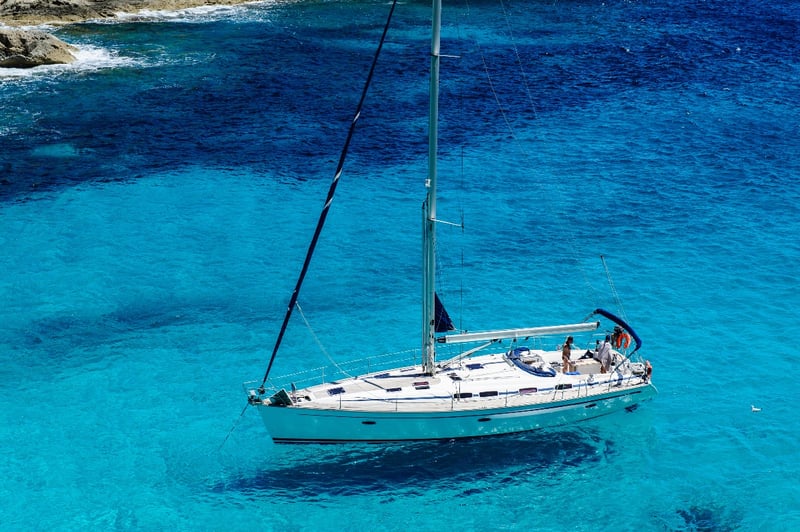
It’s long been the view of many cruisers that an all-chain anchor rode (the rope or line that connects the anchor to the boat) is superior to a rope rode. However, most racers would disagree, opting for as little chain as possible to save weight and maximise speed. The reality is, for most sailors the perfect ratio is somewhere in the middle.
The proportion of rope to chain that you use will depend on the size and type of boat you have, as well as the conditions you're facing. This blog will take you through the role of each component in the anchor rode and some guidelines for determining the correct length rode and the right proportion of rope to chain for your boat:
Rope
Rope is an important component of the anchor rode because it is light, flexible and resistant to shock. Rope also saves you precious weight on the boat and allows the boat to move freely with the wind and waves at anchor, reducing the strain on the anchor and helping to prevent it from breaking free.

Chain
Chains are heavy, very heavy. This is a big disadvantage while stored on the boat, but it is also one of their biggest advantages when in the water. The extra heft of a chain, over a rope, particularly at the end of the rode, provides weight, strength and holding power. The chain helps to keep the anchor on the bottom and prevents it from dragging when the boat is anchored.
Chains are also resistant to chafing or erosion from the ocean seabed, however, the lack of stretch in a chain means that they transmit shockwaves from the wind and waves, directly to the anchor, which may cause it to be jolted free.
Correct Scope
The rode is the combination of chain, rope and any connections that attaches the anchor to the boat. A rule of thumb for a chain/rope combination is that for every metre of water you should have 8m of rode – this is referred to as a Scope of 8:1. Therefore if you are coastal cruising with average water depths of 5m you should have at least a 40m rode. A common starting point for cruisers is assuming anchoring in 10m depths with a total rode length of 80-100m. For an all-chain rode, this scope can be reduced to 4:1
Unfortunately, this relatively simplistic method runs into problems in very shallow and/or deep waters. An alternative, and potentially better generalisation for Scope is: 15 + 4d for a rope/chain rode and 15 + 2d for an all-chain rode. For example, anchoring in 15 meters of water with rope/chain: using the 8:1 method would suggest a rode of 120m which is starting to get excessive for most anchor lockers, however the 15 + 4 x depth calculation method would give 75m.
The proportion of rope to chain?
For practical reasons, and because life is a compromise, most sailors use a combination of rope and chain in the anchor rode. As a rule of thumb, the chain should make up at least one-third of the total rode length. This will help to ensure that the anchor is held securely on the bottom, abrasion on the seabed is limited, and the rope provides enough flexibility to absorb the shock of the wind and waves in more extreme anchoring conditions.
Conclusion
It's important to note that the proportion of rope to chain in the anchor rode will depend on the size and type of boat you have, as well as the wind and sea-state conditions you're facing. These rules of thumb provide a good starting point but larger boats will typically require a longer anchor rode with a higher proportion of chain, while smaller boats may be able to get by with a shorter rode with a higher proportion of rope.
Always be sure to follow the manufacturer's recommendations for your particular anchor and consider the conditions you'll be facing when determining the right proportion of rope to chain for your boat.
If you have any questions about your anchoring system, please feel free to email us at support@upffront.com, or click the link below to see our full range of anchoring equipment:




